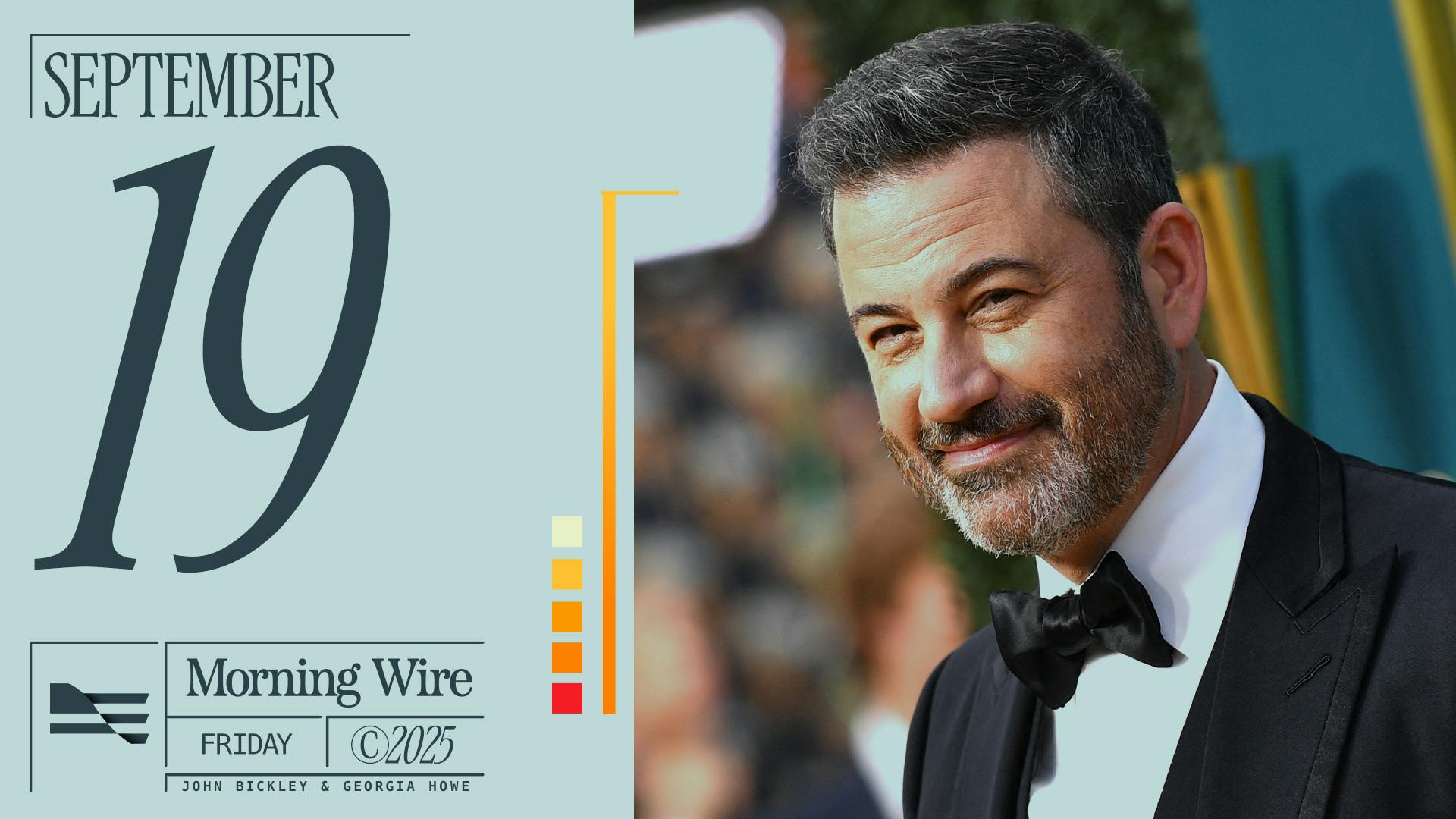
www.dailywire.com
Morning Brief: Kimmel Suspended, A Socialist Gun Club & Deportations Surge
The fallout continues over ABC’s indefinite suspension of Jimmy Kimmel’s late-night show after his comments on Charlie Kirk, an exclusive Daily Wire investigation dives into the Socialist Rifle Association, and ICE ignites a fresh surge in deportations.
It’s Friday, September 19, 2025, and this is the news you need to know to start your day.
Morning Wire is available on video! You can watch today’s episode here:
If you’d rather listen to your news, today’s edition of the Morning Wire podcast can be heard below:
ABC-Ya: Network Benches Kimmel Over Kirk Remarks
Topline: ABC has suspended Jimmy Kimmel’s late-night show “indefinitely” for his remarks about Charlie Kirk’s assassination.
The outrage: The Kimmel comments that really sparked outrage came on Monday night, five days after Kirk’s killing.
Despite reports that the suspected shooter held left-wing political views, Kimmel said this: “Hit some new lows over the weekend with the MAGA gang desperately trying to characterize this kid who murdered Charlie Kirk as anything other than one of them, and doing everything they can to score political points from it.”
Utah Republican Governor Spencer Cox and the FBI have described the accused shooter as “deeply indoctrinated with leftist ideology.” The suspect had described Charlie Kirk’s conservative views as “full of hate,” and he was in a romantic relationship with his male trans-identifying roommate.
Yet on Tuesday night, even after the backlash, Kimmel doubled down: “Meanwhile, many in MAGA land are working very hard to capitalize on the murder of Charlie Kirk …”
TL;DR: Kimmel made false statements that he certainly should have known were false in the immediate aftermath of Kirk’s death.
What ABC saw: The network acted after some heavy pressure from the major broadcasting companies that air Kimmel’s show on ABC affiliates. On Wednesday, Nexstar Media Group, which carries Kimmel on 23 ABC stations, announced it would pull episodes starting Wednesday.
Sinclair Broadcast Group, another major affiliate operator, demanded an apology to the Kirk family and a donation to Turning Point USA before it would put Kimmel back on the air. On Friday night, its ABC stations, along with those of Nexstar, will be airing a memorial for Kirk instead of Kimmel.
Behind the scenes, ABC reportedly tried to get that apology from Kimmel. But he refused, feeling he had nothing to apologize for. He also allegedly planned to take even further aim at Donald Trump supporters during his monologue on Wednesday night.
View from the FCC: As this played out, FCC Chair Brendan Carr pointed out that broadcast networks are different from print media or cable in that they require licenses from the federal government to operate. Knowingly making false, defamatory statements violates the FCC’s rules.
But that said, there is no evidence that Carr or the FCC has taken any formal action against ABC. And that’s a contrast with the Biden administration, which took formal action against conservative media.
A Socialist Gun Club?
Topline: The Department of Justice under the Biden administration focused heavily on what it called right-wing “domestic terrorism,” and now President Trump is signaling it will focus on radical left-wing movements, such as “ANTIFA,” which Trump said he is designating a “major terrorist organization.”
Introducing the SRA: The Socialist Rifle Association was founded in 2019 and by the following year, counted 10,000 “comrades.”
It operates through state-based chapters across the country, and says it educates and trains leftists on the use of firearms to protect against “fascists.”
The group was founded by two transgender men, one of whom goes by “she/it.” According to an internal survey, one-third of members identify as anarchists, one-third as Marxist-Leninists, and one-third as LGBTQ.
It issues membership cards featuring Karl Marx’s face. But perhaps more than anything, it’s wrapped up with transgender politics. Four of its 13 national leaders go by “they” pronouns.
Links to political violence: A Daily Wire review of federal court records found that membership in the Socialist Rifle Association is a common link in four high-profile incidents of political violence.
A couple of months ago, nearly a dozen people, many of them who identify as transgender, were charged with committing an armed assault on an ICE facility in Alvarado, Texas. Benjamin Hanil Song, who was charged with shooting a police officer in the neck in that incident, was allegedly a Socialist Rifle Association member.
Two separate incidents of firebombing Tesla dealerships, one the day of President Trump’s inauguration, were committed by Socialist Rifle Association members, according to prosecutors.
Link to Kirk slaying?: The Socialist Rifle Association told The Daily Wire that Kirk’s suspected assassin is not a member. But it declined to say whether his boyfriend, Lance Twiggs, was, citing confidentiality. The group has a chapter in Utah, where the suspect is from.
Follow the money: It’s structured as a nonprofit incorporated in Kansas, but its federal tax-exempt status was revoked after it failed to file paperwork with the IRS for years. It’s still been operating, so that’s one avenue that perhaps the federal government will look at.
The New Deporter-In-Chief
Topline: According to a new report by The Daily Wire, the Trump administration’s mass deportation campaign is surging – with nearly 400,000 illegal immigrants already removed from the country.
The Trump administration has set a lofty goal of one million deportations per year, a target that has never been achieved before. The pace stands at 389,000 illegal immigrants deported so far under this administration. While that’s not close to one million, it’s a huge advance compared to previous administrations. It even exceeds the record of former President Barack Obama, who was described as the “deporter-in-chief.” It also exceeds President Biden’s final year in office.
The Trump administration has hired 10,000 new immigration agents to expedite the process. However, acting ICE Director Todd Lyons recently told The Daily Wire that efforts to encourage self-deportations will undoubtedly reach the goal of one million deportees. The administration has already seen, according to DHS, two million of those.












